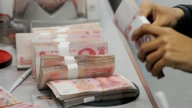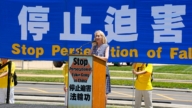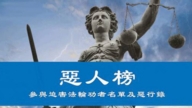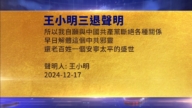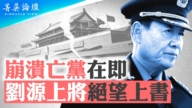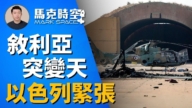【新唐人2013年08月24日訊】英國《路透社》最近報導披露,一名中共發改委官員,在一次閉門會議上,向大約30家左右的外企施壓,要求他們「坦白」所謂的壟斷行為,並且威脅:不得聘請外部律師來對抗指控,否則,會將罰金翻高一倍或兩倍。那麼,外界是怎麼看待這起事件的呢?我們一起來了解。
據《路透社》8月21號發自北京的報導,一名消息人士指稱,中共發改委官員徐新宇在7月24至25號的閉門會議上,向通用電氣和西門子等大約30家外企施壓,要求他們「坦白」壟斷行為,並且警告這些外企,不得聘請外部律師來對抗監管機構的指控。
據報導,這次會議是以對跨國企業的培訓為名義舉行的。當時也有中共商務部和國家工商總局的官員在場。
美國紐約城市大學政治學教授夏明觀察認為,中共發改委官員要求外企不得聘請外部律師,是因為中國的法律可能會和國際上發生矛盾和衝突。
夏明:「中國(共)政府顯然不願意看到在國際司法平臺上,中國(共)要去對抗西方的法律體系和法律規範。所以從某種程度上,它也是威脅在中國有投資的企業:就是不要把事情搞大,也不要讓中國政府(共)有太多的難堪。」
兩名參加這次會議的消息人士聲稱,徐新宇還向內部律師演示了如何撰寫所謂的「自我批評」,並且展示了過去反壟斷案中一些企業承認壟斷行為的信件副本。
一名與會的消息人士表示,徐新宇提到在場的企業中,有一半正接受或已經接受過發改委的調查。另一名消息人士則認為,徐新宇的話太過份。如果這些外企想對抗,徐新宇可以將罰金翻一倍或兩倍。
這則消息在網路上也引起圍觀。有網友認為發改委真是無法無天。一名青島網友海泰祥,則質疑:你發改委不也是個壟斷機構嗎?
夏明分析,目前中國的經營環境處於壟斷狀態。中共為了保護國營企業,想用「反壟斷」這個武器,來阻止西方國家的跨國企業。
夏明:「在最近幾年國營企業、尤其大中型國營企業出現國進民退了,顯然它給私營企業和三資企業帶來了很多壓力,使它們的經營環境更加惡化。在這種情況下,西方國家,尤其在大的產業上,在全球有一定的技術優勢,在中國經營,很容易摧毀中國沒太有效率又沒有技術含量的產業。」
另一方面,夏明指出,西方國家對中共在海外的惡性投資或併購,已經有所警惕,並且採取了各種反壟斷和反傾銷的措施。所以某種程度上,中共也是在報復西方國家,並且謀求討價還價。
台灣國立政治大學國際關係研究中心、美國與歐洲研究所所長湯紹成:「當然他們還是覺得有些外企可以給它帶來很大的利益。可是有一批(外企)踩到了國企的紅線或痛腳,這樣他們可能會有些『翻臉不認人』的情況。」
湯紹成表示,目前在中國做生意,純粹講法律的話,很多事情做不了。所以外企到了大陸後,它們也會有一些不合法的行為,這些把柄就給了當局一個很好的藉口來整頓。
《路透社》認為,這個消息凸顯了外企和中共監管機構的關係趨於緊張。近期反壟斷界關於這次會議的消息傳得沸沸揚揚。
夏明:「跨國公司逐漸形成一個共識,認為在中國做生意會越來越困難,甚至對他們的員工、他們自己的生命都造成一些安全(問題)。 西方國家跨國公司現在對中國的投資環境進行評估,基本採取一種收縮的戰略。」
據報導,對於這次會議,西門子聲稱不知道、通用電氣則不願置評。
採訪/易如 編輯/王子琦 後製/李勇
Chinese Regime Retaliates Against Foreign Companies in China
British Reuters recently reported that a Chinese official
from the Communist Reform Commission put pressure on foreign companies,
asking them to confess alleged monopolistic behavior, and
requiring them not to hire outside lawyers to fight allegations.
Otherwise, their fines would double or triple.
So, how do you view this incident?
On August 21, Reuters reported from Beijing that
a source alleged that
official Xu Xinyu spoke during a closed-door meeting, asking
30 foreign companies to confess monopolistic behavior
and not to hire outside lawyers to fight allegations
of regulatory agencies.
According to reports, this meeting was held for
multinational enterprise training.
Many officials from the Ministry of Commerce
and State Administration for Industry were also present.
Professor Xia Ming, political science,
City University of New York, thinks that
a Chinese official asked companies not to hire outside
lawyers because there might be conflicts between the Chinese and international laws.
Xia Ming: “The Chinese Communist Party (CCP) is reluctant
to show China’s intention to fight against the Western legal
system on the international judicial platform.
To some extent, it also threatens foreign investments in China.
In other words, keep things simple and don’t embarrass
the CCP.”
Two People who attended the meeting claimed that
Xu Xinyu showed a copy of self-criticism and
some copies of other enterprises’ confessions in the past.
Half of the companies attending the meeting had
received the survey or in the process of getting one.
Others said Xu’s remarks were too severe.
If these foreign companies want to fight,
Xu Xinyu may increase their fines.
This news also attracted negative responses from netizens.
A Qingdao netizen said, “Isn’t the National Development
and Reform Commission (NDRC) also a monopolistic organization?"
Xia Ming believes that current businesses are
in a monopoly status in China.
The CCP wants to protect state-owned enterprises, so it uses
anti-monopoly to stop multinational corporations from the West.
Xia Ming: “In recent years, many large state-owned
enterprises advanced and put much pressure
on private sector and foreign enterprises,
worsening their operating environment.
Under this circumstance, many large Western industries
possess certain technical advantages,
when operating in China, can easily destroy China’s
inefficient and non-tech industries."
Xia also pointed out that Western countries have adopted
various anti-monopoly and anti-dumping measures
because they are aware of CCP’s vicious investments,
mergers and acquisitions overseas.
So, to some extent, this is retaliation against
Western countries and leverage in bargaining.
Tang Shao-Cheng, director of International Relations Research
Center, Taiwan’s National Chengchi University: “Of course,
the CCP realizes foreign investments in China
are a good thing,
but these foreign enterprises stepped on the toes of
state-owned enterprises, so it reacts and shows its anger."
Tang Shao-Cheng: “If foreign companies strictly follow
Chinese law, they cannot do much business in China.
So, they did something illegal, which gives the CCP
an excuse to rectify the situation."
Reuters believes that the news highlights the strained
relationship between foreign companies and the CCP’s regulatory agencies.
Recent news of anti-monopoly has caused uproar.
Xia Ming: “Foreign companies have formed a consensus,
namely, doing business in China is difficult
and their employees’ lives may be endangered.
Therefore, the Western countries are basically re-evaluating
their investment environment and taking a contraction strategy."
According to reports, Siemens, as its reaction, claimed
to not know about this meeting and General Electric was unwilling to comment.



